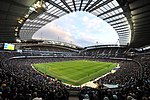The East Manchester Academy
2010 establishments in EnglandAcademies in ManchesterEducational institutions established in 2010Greater Manchester school stubsSecondary schools in Manchester ... and 1 more
Use British English from February 2023
The East Manchester Academy is a coeducational secondary school located in the Beswick area of Manchester, England.It was established as an academy in September 2010, and was originally sponsored by Laing O'Rourke, Lend Lease, Manchester City Council and The Manchester College. The school also had specialisms in The Built Environment and Performing Arts.However, due to poor performance the school became part of the Education and Leadership Trust in September 2016.Today, The East Manchester Academy offers GCSEs, BTECs and vocational qualifications as programmes of study for its pupils.
Excerpt from the Wikipedia article The East Manchester Academy (License: CC BY-SA 3.0, Authors).The East Manchester Academy
Grey Mare Lane, Manchester Bradford
Geographical coordinates (GPS) Address Nearby Places Show on map
Geographical coordinates (GPS)
| Latitude | Longitude |
|---|---|
| N 53.47841 ° | E -2.195365 ° |
Address
St Brigid's RC Primary School
Grey Mare Lane
M11 3DS Manchester, Bradford
England, United Kingdom
Open on Google Maps






